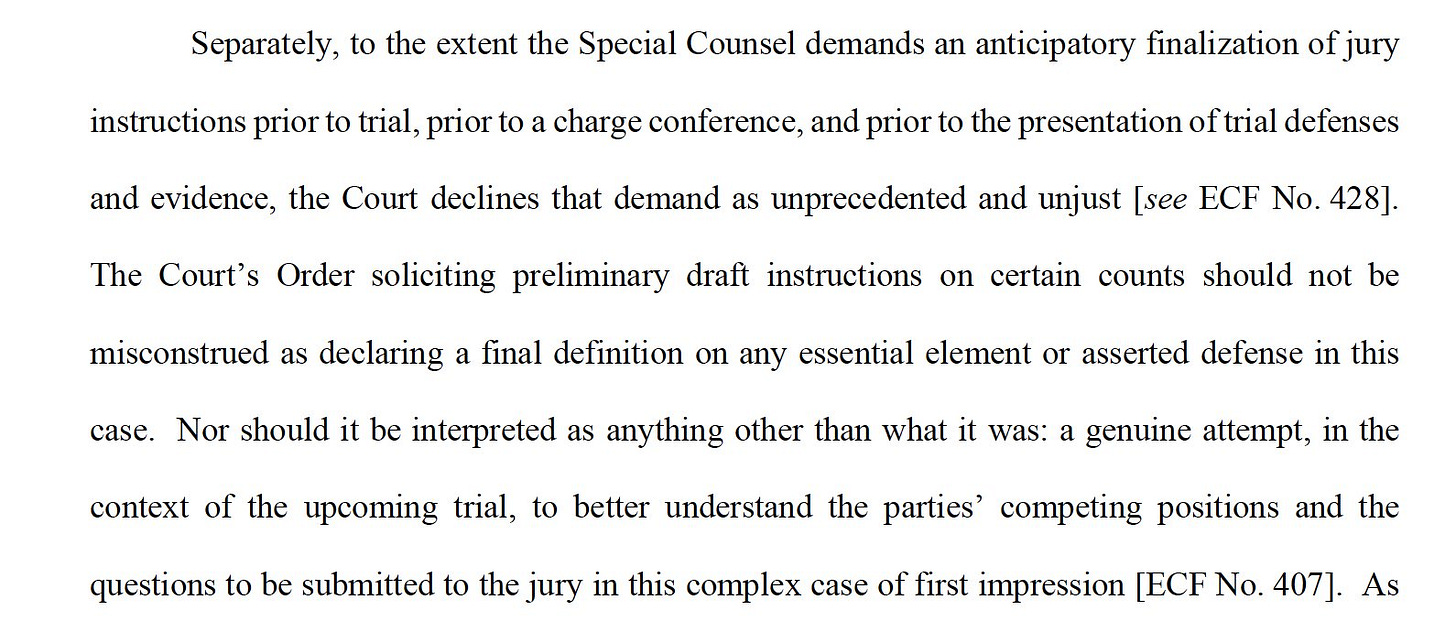Judge Cannon Rules
Judge Cannon rules are not the rules lawyers are used to seeing applied in a courtroom. Hers is a court increasingly reminiscent of “Alice’s Adventures in Wonderland,” where important matters are upside down. The Queen of Hearts told Alice during the trial of the Knave of Hearts, “sentence first, verdict afterwards.” Judge Cannon ordered Jack Smith to provide her with jury instructions on the application of the Presidential Records Act (PRA) long before the case could even conceivably be ready to go to trial—jury instructions are typically filed shortly before trial begins. Judge Cannon hasn’t even ruled definitively on the role the Presidential Records Act will play in permitting Trump to mount a defense (which, of course, it shouldn’t do at all). Increasingly, the common theme seems to be that she finds disingenuous paths around rulings that would permit the Special Counsel to appeal her errors.
On Thursday, the Judge responded to the Special Counsel’s response to her order for proposed jury instructions, predicated on an alternate reality where the Presidential Records Act plays a role in whether Trump violated the Espionage Act. Jack Smith definitively put to rest any notion that could be the case in his briefs and again in the response to the Judge’s order we reviewed earlier this week.
In her brief two-page order, the Judge denied *sort of* Trump's motion to dismiss the classified documents case based on the PRA. You’ll recall Trump’s argument was that it gave him the ability to designate classified material as personal records, which somehow meant he couldn’t be prosecuted for keeping Top Secret material in his bathroom and ballroom at Mar-a-Lago. Judge Cannon DENIED Trump’s motion, but with this odd language about the four corners of the indictment. She does point out correctly, that the indictment doesn’t rely on the PRA to charge Trump (because, and I’m trying to avoid shouting here, the PRA has no relevance to the Espionage Act charges). But it goes downhill from there.
Judge Cannon seems to be walking back the denial a bit, leaving some ambiguity about the finality of her ruling on the PRA’s applicability to the case. She at least declines to finalize the jury instructions, which would make sense in a normal case where a judge would be ruling on pre-trial motions and not thinking about formal jury instructions at this stage. What doesn’t make sense is that the Judge asked for jury instructions at all this early on. They are usually filed a few days before trial, tweaked during the process, and finalized in a charge conference shortly before the Judge reads them to the jury. So it’s bizarre that she first demanded them, seemingly as a way of avoiding ruling on Trump’s motion to dismiss the case under the PRA, and then got angry with the government before indignantly refusing to finalize them herself.
In his response earlier this week, Smith asked her to rule on the PRA motion. He pointed out that since Trump’s argument about the PRA wasn’t valid, there would be no need to instruct the jury about it. But Judge Cannon seemed to view the jury instructions side show as a way of winking and nodding at Trump about the future of his defense once the case went to trial. So it’s off base for her to call Smith’s request to clarify the ground rules "unprecedented and unjust." It’s possible to imagine that language come back to haunt her, when the Eleventh Circuit ultimately looks at this situation—because that moment is inevitably coming—and decides whose position here has been unprecedented and unjust.
It’s no wonder, given the Judge’s strange handling of this matter, that legal analysts are still searching for ideas about the best strategy the Special Counsel’s office can use to deal with the situation, without coming up with a definitive answer. When it comes to the PRA issue, the government needs (and is entitled to) a ruling before trial begins—and to appeal it if it goes against them. There is an acceptable range of variation in how courts handle cases, but this is the type of issue judges typically recognize and rule on so the appeal can proceed, just like Judge Chutkan did in Washington, D.C., with the immunity issue. Instead, Judge Cannon seems determined to try and sandbag the prosecution. Smith’s position makes sense: the prosecution can’t appeal after an acquittal, so they need to be able to appeal a clearly erroneous decision by the Judge on the law before an acquittal happens. For the Special Counsel’s office, being in Judge Cannon’s courtroom has become akin to having a seat at the Mad Hatter’s tea table.
Judge Cannon has repeatedly given herself wiggle room by putting off a ruling until trial gets underway—she did that previously with Trump’s motion to dismiss on vagueness grounds. If she rules in Trump’s favor once the trial is underway, that’s it. The government has no right of appeal because of double jeopardy. Prosecutors need to solve that problem before trial starts.
So, what’s the Special Counsel to do? A number of different options are being floated. None of them are perfect, but a strategy will have to be crafted.
Mandamus: Lots of talk about filing a writ of mandamus, but that was before Judge Cannon entered her order. It’s probably off the table for now. Had Judge Cannon refused to rule, the Special Counsel could have tried to use the writ to force her to do so. Had she ruled against him on the PRA motion he could have taken a direct appeal. But now, she has entered an order, and because mandamus, a rarely used writ, is limited to situations where a judge won’t do something that they clearly must do, or is doing something they clearly can’t do, it probably doesn’t work here. Mandamus is usually about the performance of purely ministerial duties, something the court doesn’t have discretion about in a situation where the party seeking mandamus doesn’t have any other remedy. In the language the Supreme Court has used since 1840, “The power of a district court to compel official action by mandatory order is limited to the enforcement of nondiscretionary, plainly defined, and purely ministerial duties.” And in 1919, "But where there is discretion … even though its conclusion be disputable, it is impregnable to mandamus." The very limited nature of the writ is well-established and Judge Cannon’s order seems to put her beyond it, for now.
Motion in limine: Some folks have suggested the government should file a pre-trial motion asking the Judge to keep Trump from mentioning the PRA during trial. This is a good idea, and the government should definitely do it. The problem is that standing on its own, it may not do the trick. For one thing, the Judge could put off ruling, almost indefinitely. She’s shown a knack for doing that. This is probably part of, but not a complete strategy.
Recusal motion: This continues to have a lot of appeal for the government and I continue to think it may be their best shot. Recusal works best if it comes along with the government appealing a specific action the Judge has taken, like a ruling against the government on the PRA motion. But even without a ruling, given her history, her delays, and her odd orders and partial rulings, this one is better than mandamus at this point.
A better option? The government might file a motion asking the Judge to clarify her ruling on the PRA. This would be akin to the motion in limine, but it would ask her to clarify/reconsider the order that on the one hand seems to deny Trump’s motion to dismiss under the PRA while simultaneously leaving the possibility of a jury instruction on it open. A failure to respond or clarify the ruling could set up a recusal motion. Perhaps, cornered, she might even give the Special Counsel the ruling they seek on the PRA and put the issue to rest.
One way or another, on one issue or another, this case is very likely headed to the Eleventh Circuit before trial, even if that means more delay. If Judge Cannon continues as she has, the outcome seems to be all but a foregone conclusion. And it’s difficult to believe that, at this point, any panel of Eleventh Circuit judges wouldn’t believe the Judge needs to step aside.
It’s worth noting that because Judge Cannon has delayed rulings, there are issues beyond the PRA that must be decided before trial and could result in an appeal. There are motions regarding presidential immunity motion and selective/vindictive prosecution still pending. There are classified evidence issues yet to be decided under the Classified Information Procedures Act (CIPA). There might be motions in limine that result in a decision by the Judge to exclude evidence the government obtained during the search of Mar-a-Lago or that Trump claims is protected by attorney-client privilege that could lead to pre-trial appeals.
The issues with this case and Judge Cannon are far from over.
Thanks for reading Civil Discourse! If you aren’t already, I hope you’ll consider becoming a paid subscriber, which lets me devote more time and resources to this work and reach more people, by making the newsletter available for free. I really appreciate y’all being here with me. Can’t close tonight without saying Roll Tide.
We’re in this together,
Joyce





Joyce, thank you, thank you, thank you for this. Your clear and concise explanation is so helpful here. I spent most of my career in federal court (not as an attorney) and am familiar with most procedures but often not the “why” certain motions are filed at specific times. I thought it really strange too the order things have been going in this case. The “Alice in Wonderland” analogy is so apropos, and it makes me wonder if it’s her inexperience with jury trials, laziness, arrogance, or listening to some disbarred lawyer laying out weird strategies to keep her on the case. I am so grateful for your work on this.
What a mess…and SO many issues still to be decided. It’s like watching a very slow train wreck.